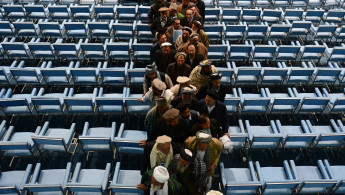Afghan rivals resume talks for peace
Stakes are high for the talks which follow a week of US-Taliban negotiations with both sides eyeing a resolution to the bloody 18-year conflict.
US Secretary of State Mike Pompeo tweeted that the Afghan gathering "has been a long time coming" and praised the country's "government, civil society, women, and Taliban" for coming together.
Washington has said it wants to seal a political deal with the Taliban ahead of Afghan presidential polls due in September to allow foreign forces to begin to withdraw.
Around 70 delegates are attending the two-day gathering which has been organised by Germany and Qatar.
Qatar's counter-terrorism special envoy Mutlaq al-Qahtani told AFP "both sides are making progress".
"By the end of tonight we can reach a kind of positive conclusion that is acceptable to both sides," he said.
"The differences is almost so narrow... we are quite frankly surprised how serious both sides are and they are so committed to putting an end to this conflict."
Germany envoy Markus Potzel said "history will remember those who were able to set their differences aside for the sake of the country" as he opened the dialogue on Sunday.
Delegate Asila Wardak, a member of the High Peace Council established by former president Hamid Karzai to engage with Taliban elements, said good progress was being made.
But she stressed that the language of a joint statement would first have to be agreed by the entire conference which could slow progress.
The Taliban spoke about "women's role, economic development, (and) the role of minorities" in a future settlement, she said.
The so-called intra-Afghan meetings follow six days of direct US-Taliban talks that have been put on hold for the two-day Afghan conference and are set to resume Tuesday, according to both sides.
'Most productive'
US lead negotiator Zalmay Khalilzad said Saturday that the latest round of US-Taliban talks "have been the most productive of the rounds we've had with the Talibs".
"We want a stable Afghanistan," he told reporters on the sidelines of the dialogue on Monday.
"Afghans meeting with the Taliban was a big success."
The Taliban said they were "happy with progress".
The United States is not participating directly in the two-day Afghan conference, which is being attended by political heavyweights, government officials and at least six women.
The Taliban, who have steadfastly refused to negotiate with the government of President Ashraf Ghani, have stressed that those attending are only doing so in a "personal capacity".
Ghani's administration, which the Taliban consider a puppet regime, has also been excluded from the direct US-Taliban talks.
Sunday and Monday's gathering is the third such meeting following landmark summits in Moscow in February and May.
An agreement with the Taliban is expected to have two main pillars - a US withdrawal from Afghanistan and a commitment by the militants not to offer sanctuary to jihadists.
The Taliban's relationship with Al-Qaeda was the main reason for the US invasion nearly 18 years ago.
But the thorny issues of power-sharing with the Taliban, the role of regional powers including Pakistan and India, and the fate of Ghani's administration remain unresolved.
The Taliban, believing they have the upper hand in the war, have kept up attacks even while talking to the United States and agreeing to the Afghan dialogue.
A Taliban car bomb in eastern Afghanistan killed at least 12 people and wounded scores more on Sunday, officials said.
Despite the violence, both the Taliban and US have been positive about their engagement.





 Follow the Middle East's top stories in English at The New Arab on Google News
Follow the Middle East's top stories in English at The New Arab on Google News
![The UAE is widely suspected of arming the RSF militia [Getty]](/sites/default/files/styles/image_330x185/public/2024-11/GettyImages-472529908.jpg?h=69f2b9d0&itok=Yauw3YTG)
![Netanyahu furiously denounced the ICC [Getty]](/sites/default/files/styles/image_330x185/public/2024-11/GettyImages-2169352575.jpg?h=199d8c1f&itok=-vRiruf5)
![Both Hamas and the Palestinian Authority welcomed the ICC arrest warrants [Getty]](/sites/default/files/styles/image_330x185/public/2024-11/GettyImages-2178351173.jpg?h=199d8c1f&itok=TV858iVg)